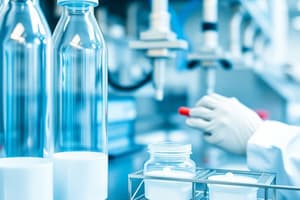Podcast
Questions and Answers
What is the purpose of Quality Control in Good Manufacturing Practice (GMP)?
What is the purpose of Quality Control in Good Manufacturing Practice (GMP)?
- To ensure the production of quality products in a controlled environment (correct)
- To establish standards and guidelines for pharmaceutical products
- To identify and assess quality risks associated with pharmaceutical products
- To verify and validate the quality of products and processes
What are the Acceptance criteria used for in the context of Quality Control in GMP?
What are the Acceptance criteria used for in the context of Quality Control in GMP?
- To verify and validate the quality of products and processes
- To identify and assess quality risks
- To evaluate whether a product meets the required standards (correct)
- To establish references for ensuring product quality
What do pharmacopoeias provide in the context of pharmaceutical products?
What do pharmacopoeias provide in the context of pharmaceutical products?
- Collection of quality risk management guidelines
- Standards and guidelines for the production and quality control of medicines (correct)
- Criteria used to evaluate whether a product meets required standards
- References for ensuring product quality
What is the primary focus of Quality Risk Management guidelines established by the International Council for Harmonisation (ICH)?
What is the primary focus of Quality Risk Management guidelines established by the International Council for Harmonisation (ICH)?
What is the role of Quality Assurance in Good Manufacturing Practice (GMP)?
What is the role of Quality Assurance in Good Manufacturing Practice (GMP)?
What is the purpose of regulatory compliance in GMP?
What is the purpose of regulatory compliance in GMP?
Why is documentation considered a crucial part of GMP?
Why is documentation considered a crucial part of GMP?
What does cleanliness standards in GMP primarily aim to achieve?
What does cleanliness standards in GMP primarily aim to achieve?
Why is equipment validation considered a critical aspect of GMP?
Why is equipment validation considered a critical aspect of GMP?
Which activity is NOT included in the concept of GMP?
Which activity is NOT included in the concept of GMP?
Flashcards
Good Manufacturing Practice (GMP)
Good Manufacturing Practice (GMP)
A set of guidelines ensuring quality product production in a controlled environment, applicable to pharmaceuticals.
Quality Control in GMP
Quality Control in GMP
A critical GMP aspect involving checks and tests to ensure products meet required standards.
Acceptance Criteria in Quality Control
Acceptance Criteria in Quality Control
Criteria used to evaluate if a product meets the necessary standards, established at the start of production.
Pharmacopoeias
Pharmacopoeias
Signup and view all the flashcards
Quality Assurance
Quality Assurance
Signup and view all the flashcards
Regulatory Compliance in GMP
Regulatory Compliance in GMP
Signup and view all the flashcards
Documentation in GMP
Documentation in GMP
Signup and view all the flashcards
Environmental Monitoring
Environmental Monitoring
Signup and view all the flashcards
Personnel Hygiene
Personnel Hygiene
Signup and view all the flashcards
Equipment Validation
Equipment Validation
Signup and view all the flashcards
Study Notes
Good Manufacturing Practice: A Comprehensive Guide
Good Manufacturing Practice (GMP) is a set of guidelines that ensure the production of quality products in a controlled environment. GMP is applicable to all pharmaceutical products, whether they are used in humans, animals, or for veterinary purposes. This article provides an overview of GMP, focusing on quality control, regulatory compliance, documentation, cleanliness standards, and equipment validation.
Quality Control
Quality control is a critical aspect of GMP, as it involves a series of checks and tests to ensure that the products meet the required standards. The International Council for Harmonisation (ICH) has established Quality Risk Management guidelines that help pharmaceutical companies identify and assess quality risks associated with their products. Quality control measures include:
-
Acceptance criteria: These are the criteria used to evaluate whether a product meets the required standards. They are established at the beginning of the production process and are based on the expected results from the process.
-
Pharmacopoeia: Pharmacopoeias are collections of standards and guidelines for the production and quality control of medicines. They are used as references to ensure that products meet the required standards.
-
Quality assurance: Quality assurance is a process that involves verifying and validating the quality of products and processes. It includes activities such as conducting audits, assessing risks, and evaluating the effectiveness of quality control measures.
Regulatory Compliance
Regulatory compliance is another essential aspect of GMP. It involves following the guidelines and regulations set by regulatory bodies such as the Food and Drug Administration (FDA) and the European Medicines Agency (EMA). Compliance with these regulations ensures that products are safe and effective for their intended use.
Documentation
Documentation is a crucial part of GMP, as it provides a record of the production process and helps ensure that products meet the required standards. Documentation includes records of production processes, quality control measures, and any deviations from the standard processes.
Cleanliness Standards
Cleanliness standards are essential in GMP to ensure that products are produced in a clean environment. These standards include:
-
Environmental monitoring: This involves monitoring the cleanliness of the environment where products are produced. It includes testing the air, surfaces, and equipment for microbial contamination and particles.
-
Personnel hygiene: Personnel involved in the production process must maintain strict hygiene standards to prevent contamination.
-
Cleaning and maintenance: Equipment and facilities must be cleaned and maintained regularly to ensure that they remain free from contamination.
Equipment Validation
Equipment validation is a critical aspect of GMP, as it ensures that equipment used in the production process is functioning correctly and consistently. Validation involves testing and documenting the performance of equipment to ensure that it meets the required standards.
In conclusion, GMP is a comprehensive set of guidelines that ensures the production of high-quality pharmaceutical products. By adhering to these guidelines, companies can ensure that their products are safe, effective, and meet the required standards.
Studying That Suits You
Use AI to generate personalized quizzes and flashcards to suit your learning preferences.




